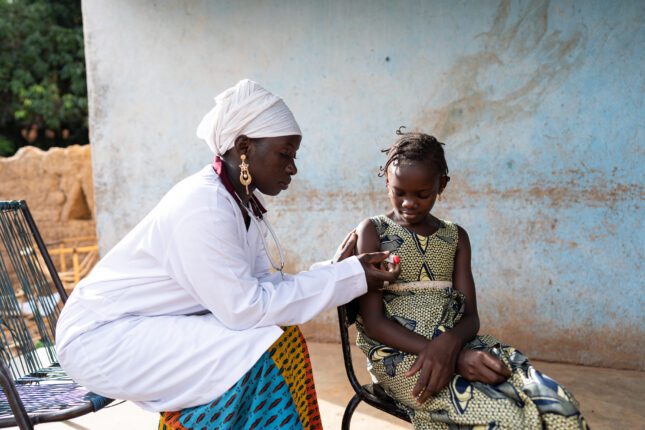-
Addressing Africans’ Top Concerns Means Advancing Women’s Rights
October 29, 2025 By Claire DoyleFrom Kenya to Morocco to Madagascar, waves of protest have erupted across Africa. Africans—and especially young Africans—have grown increasingly frustrated with a lack of economic opportunities.
So, it is no surprise that when Afrobarometer, a pan-African, non-partisan survey research organization, asked people across 39 African countries which issues they think their governments should prioritize, people ranked unemployment as the top policy priority. Health and management of the economy rounded up the top three concerns. In the survey, conducted between 2021 and 2023, one in three people cited unemployment among the top issues for government to address. Nearly as many respondents (29 percent) cited health. Across the Sahel, people are also growing more concerned about security.
These broader trends hold true among young Africans too. In the latest round of the survey, conducted between January 2024 and August 2025, almost half of young people in Africa (between 18 and 35 years old) said that job creation was the number one issue they would prioritize for additional government spending that targets young people. More than a third of them (37 percent) ranked health as a top issue for government to tackle.
Gender issues and women’s rights provide one important entry point to address these salient concerns. Advancing women’s rights, including access to education and support for sexual and reproductive health and rights (SRHR), empowers women to lead healthy, productive, and civically engaged lives. It is also a necessary piece of the puzzle for both long-term economic resilience and building a robust health system.
Indeed, while this constellation of issues may not appear at the top of the priority list, evidence suggests that boosting girls’ education and SRHR improves health outcomes, spurs employment, and drives greater economic prosperity. Research by the Guttmacher Institute show that each dollar invested in SRHR generates more than 8 US dollars in social and economic returns. Each additional year of schooling also can increase a girl’s earning potential by 20 percent.
Despite support, gender equality falls short across Africa
The latest Afrobarometer survey reveals discrepancies between public sentiment and reality for women in Africa. Although there is strong support for gender equality across the continent, inequality and violence against women still runs deep. And while men and women have both seen gains in education, economic status, and connectivity, significant gender gaps persist.
For instance, men consistently report higher rates of civic engagement across all measures. Sixty-three percent of men have at least a secondary education, compared to only 54 percent of women. Alarmingly, 32 percent of women cite gender-based violence (GBV) as a top women’s rights issue. Sexual harassment and discrimination in schools, workplaces, and political spaces also remains pervasive, with 27 percent of respondents saying that sexual harassment and discrimination of girls in schools occurs “often” or “always.”
Tackling these issues is fundamental to furthering women’s rights. Yet addressing these inequities would not only improve outcomes for individuals and families, it would also benefit communities by boosting employment and advancing economic development. GBV can disrupt women’s employment, limit their access to education, and lead to greater healthcare costs. In 2021, the IMF found that increased violence against women measurably reduced economic activity. Conversely, research by the World Bank suggests that expanding girls’ education creates major economic boons for their communities and countries.
A call to better protect women and girls
Against the sobering backdrop of GBV and sexual harassment and discrimination, a large majority of people polled across Africa (75 percent) say they believe the police and courts are not doing enough to protect women and girls.
This finding points to a low level of trust in governing authorities and the institutions meant to protect civilians, including women and girls. It underscores a broader perception that state actors are not fulfilling their mandate and that confidence in government capacity and accountability is eroding.
In the 2021-2023 Afrobarometer survey, the police were widely perceived as corrupt and unprofessional. These negative perceptions of poor police professionalism and corruption correlate with low public trust in the police, low ratings of government performance, and a heightened sense of insecurity among citizens.
If police and courts do not reliably protect women and girls, it is essential to understand which authority figures women and girls trust instead. The 2021-2023 Afrobarometer survey reveals that religious and traditional leaders are the most trusted institutions on the continent. These authority figures could provide a valuable avenue for policymakers on the continent to build stronger protections for women and girls.
Realizing women’s autonomy in marriage and reproductive health
Ensuring that women across the continent can make their own decisions about marriage and their reproductive health also is directly linked to higher labor force participation for women and overall economic gains. In order to better understand where African citizens stand on these issues today, Afrobarometer included a set of questions on SRHR for the first time in its 2024-2025 survey.
The new data suggests that most Africans support women’s autonomy in decisions about marriage (75 percent), as well as in decisions about when and how many children to have (62 percent). However, Africans are divided when it comes to access to contraception: 58 percent express support for access to contraceptives regardless of marital status, and just under half of people are in favor of access regardless of age.
In several West African countries where the Ouagadougou Partnership works to accelerate progress on family planning, Afrobarometer data shows lower-than-average support for reproductive autonomy and contraceptive access. While this regional snapshot helps identify where barriers remain, it is important to recognize that these attitudes vary widely across countries—reflecting diverse histories, religious traditions, and policy contexts.
Rather than averaging across vary different settings, it is more useful to understand country-specific factors that influence support for SRHR and how targeted investments can build trust and acceptance. Higher investments in health services and education are part of the solution, but they are not a silver bullet. Past investments—such as those made through a United States’ HIV/AIDS initiative, the President’s Emergency Plan for AIDS Relief (PEPFAR)—have shown that improving health outcomes does not automatically translate into greater support for contraception or women’s autonomy.
For example, in several countries where PEPFAR has worked closely with trusted local and faith-based partners, progress was greatest when programs engaged community leaders who were open to change. Building coalitions with such leaders, whether religious, traditional, or youth-focused, has proven to be one of the most effective strategies for advancing women’s rights and SRHR in culturally sensitive contexts.
Making smart and effective investments in SRHR and girls’ education is a crucial avenue for addressing some of the most universal and urgent issues facing Africa, especially amid increasing discontent. By investing in women and girls, policymakers are also supporting economic growth, strengthening health systems, and supporting the resilience of communities, bringing far-reaching benefits for all.
Editor’s Note: This article draws on insights shared during a private roundtable discussion with Afrobarometer hosted by the Stimson Center’s Environmental Security Program and the Population Institute. The article was revised after its initial publication to clarify regional references and examples related to women’s rights and reproductive health.
Sources: Afrobarometer, Contraception and Reproductive Medicine, International Monetary Fund, Plan International, Population Institute, SDG Action, The Denis & Lenora Foretia Foundation, The New York Times, World Economic Forum.
Photo Credit: Licensed by Adobe Stock.
 A Publication of the Stimson Center.
A Publication of the Stimson Center.









